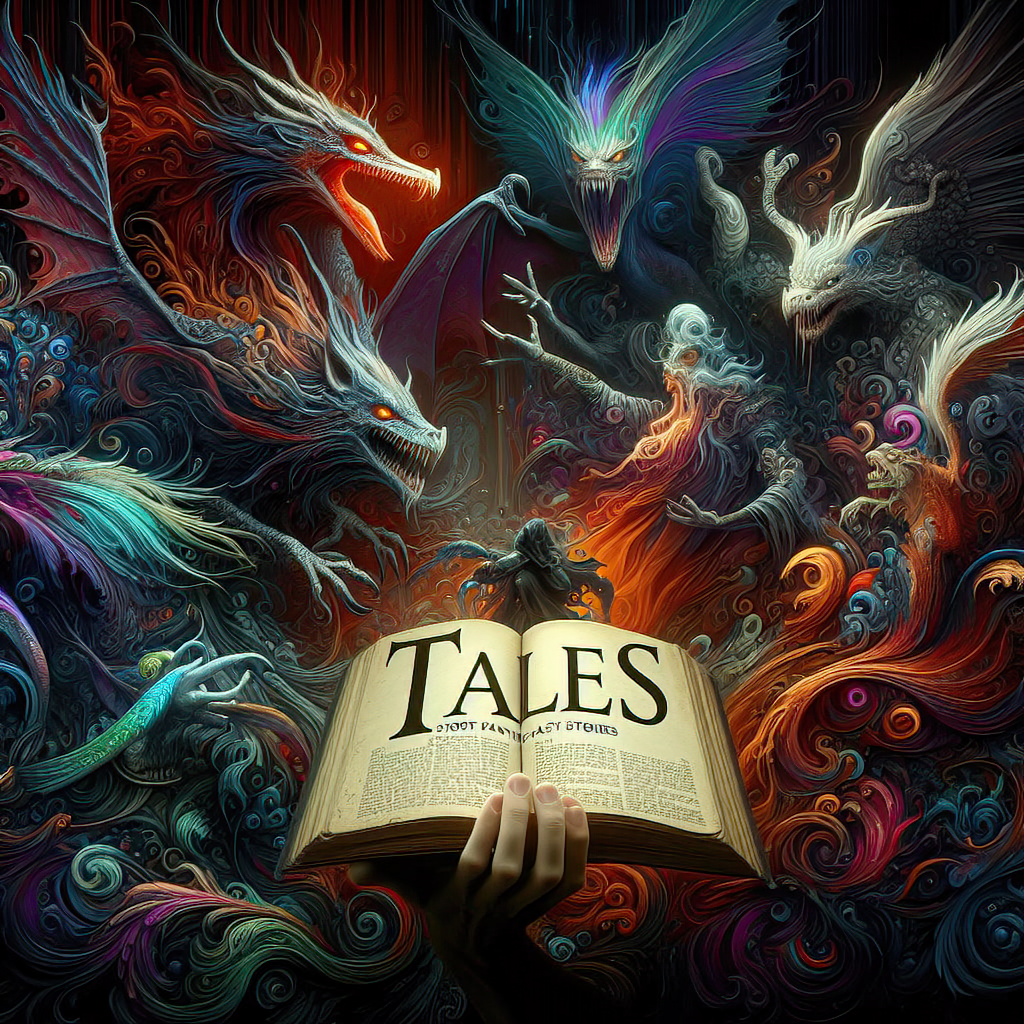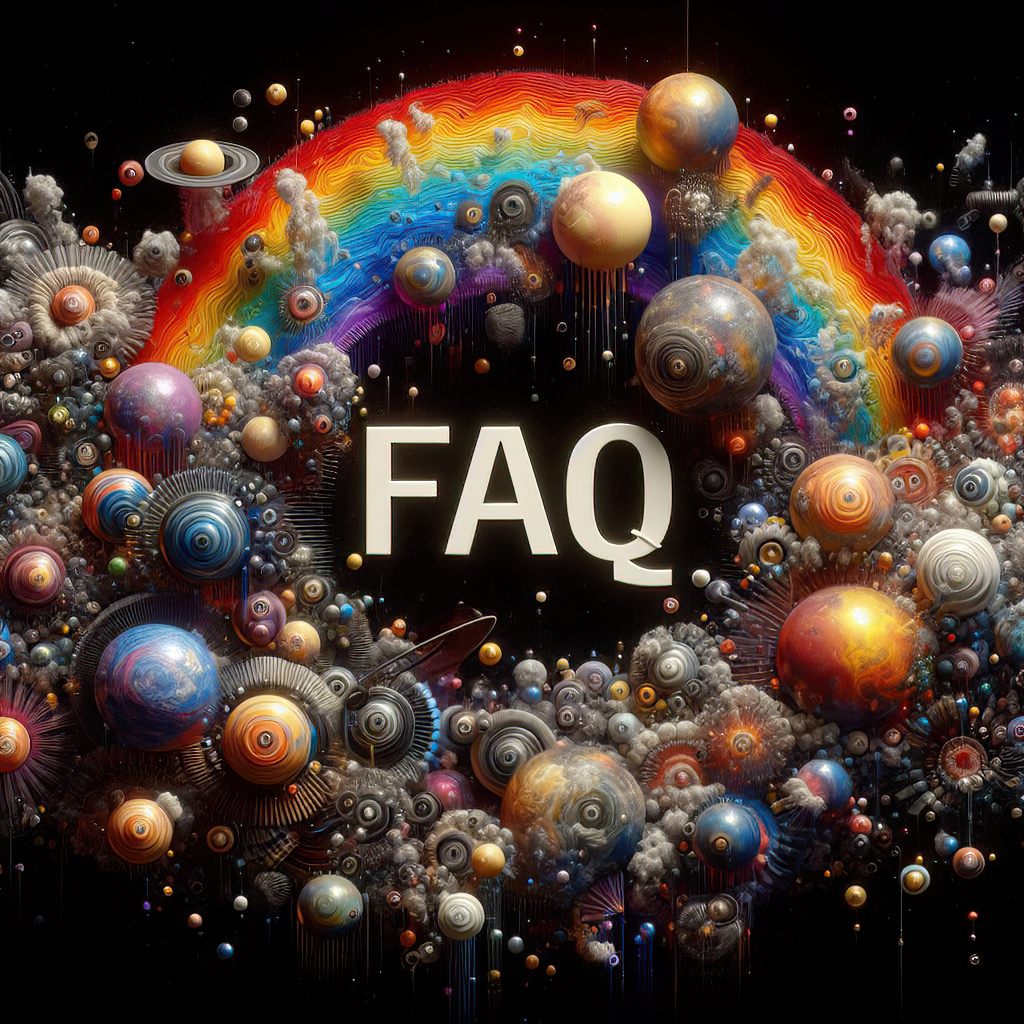por Bill Tiepelman
The Pumpkin Sprite
The Brat of the Patch
They called her The Pumpkin Sprite, though if you asked anyone who had suffered her company, the term “sprite” was far too generous. Sprites were supposed to be delicate, sparkly little things—ethereal mischief with a sprinkling of charm. She was none of those. Instead, she was a pint-sized tyrant wrapped in striped leggings, stomping about the pumpkin patch like she’d inherited it from a long line of vegetable royalty. Brat, goblin, demon-child—those were the names whispered when she was out of earshot. But “Pumpkin Sprite” had stuck, mostly because no one wanted to say the other titles aloud where she might hear and take offense. And oh, did she take offense.
Her pumpkin patch kingdom stretched at the edge of the village, where the fields dipped into shadow and the soil smelled of smoke and secrets. She lived inside a hollowed-out pumpkin gourd—an absurdly oversized one, fat and orange and veined like it had been force-fed moonlight. Inside, she had carved it into a crooked home: shelves of stolen goods (candlesticks, spoons, and at least three pairs of boots), curtains stitched together from scarecrow rags, and a throne made entirely of gourds stacked and glued together with sticky sap. Her sense of interior design could best be described as “feral flea market,” but she sat on her throne with the smugness of a monarch anyway, hat tilted, chin lifted, daring anyone to question her authority.
Every October, she made her presence known. The first chill wind blew, the first pumpkin ripened, and out she came, shrieking like a banshee who’d had one too many ciders. Villagers dreaded this season, though they’d never admit it out loud—because admitting fear gave her strength. And strength she did not need. She strutted into town on boots several sizes too big, stolen from a cobbler who still grumbled about the theft but hadn’t dared ask for them back. Her arrival was always heralded by a crow that flew ahead of her, squawking as if announcing: The Brat is Coming. Brace Yourselves.
Her reputation had been earned over years of what one might generously call “antics,” though a more accurate word might have been “crimes.” She once painted faces on hay bales so convincing that a farmer nearly fainted when he thought the straw was watching him undress. Another time, she rearranged an entire pumpkin harvest into crude shapes that no decent villager would admit to recognizing, yet every single one of them blushed when they saw it. She locked one man’s chickens inside his outhouse for three days, and when he finally opened the door, he was nearly pecked to death by furious hens with a new taste for vengeance. The Sprite claimed it was “art.” The villagers called it “grounds for exorcism.”
But what unnerved people most wasn’t the bratty tricks. It was the way strange things happened when her mood shifted. If she laughed—really laughed, that wild, shrill, spine-prickling sound—the jack-o’-lanterns carved for All Hallows’ Eve would flicker in unison, as though bowing to her humor. If she pouted, the wind grew sharp enough to sting your cheeks, and frost would creep across windows in delicate patterns that looked suspiciously like rude hand gestures. And if she ever whispered your name—soft, almost sweet—you would find pumpkin vines crawling up your doorstep by morning, leaves pressed against your door like green fingers itching to get inside. Some claimed the vines even tried the doorknob, twisting, pulling, testing. But of course, no one wanted to confirm that part.
So, the villagers tolerated her. Better to pretend her pranks were amusing than risk her wrath. Better to chuckle nervously when she shouted “Bow, peasants!” from atop a stump, than to call her a pest to her face. Even the animals had learned their strategies. Raccoons smirked politely when she demanded compliments. Crows rolled their eyes only when she wasn’t looking. And the scarecrows—stitched together with grins that seemed a little too wide—muttered under their breath when she passed by. “Here we bloody go again,” one scarecrow was overheard grumbling, its straw jaw creaking ominously. But the scarecrows never said it too loud, because there were rumors even they weren’t immune to her moods.
The Pumpkin Sprite thrived on attention, and she would do nearly anything to get it. She once staged an elaborate “coronation” in the middle of the market square, draping herself in a cape stolen from the church choir, a crown made of pumpkin stems balanced precariously on her head. “Bow to your Pumpkin Queen!” she screeched, brandishing a scepter made of a broom handle topped with a gourd. The villagers clapped awkwardly, trying to smile as she demanded tax payments in the form of candy corn. When the baker’s wife refused, her sourdough loaves rose the next morning with mocking little faces, smirking at everyone who tried to slice them.
Deep down, no one truly believed she was just a brat. There was something older in her, something feral and ancient, hiding behind the bratty grin. Why did the pumpkins always seem to swell unnaturally large in her presence? Why did the vines seem to twitch toward her ankles like eager pets? And most troubling of all: why did no one remember a time before she appeared in the village? Some whispered she was born from the first cursed seed planted in the patch, sprung to life like a fungus given form. Others claimed she was the child of a witch who had fed too much blood to her garden. But no one dared ask her directly—not unless they wanted vines on their doorstep and whispers in their dreams.
Still, life went on. The villagers endured her October reign the way one endures a toothache: constant, painful, but easier to ignore than to confront. And the Pumpkin Sprite relished it, strutting across the fields, tossing candy corn into the mud, cackling when the pigs scrambled to eat it. She was bratty, she was unbearable, she was terrifyingly powerful. And as the moon rose over the crooked pumpkin patch, lighting her orange throne and her crooked grin, she whispered a promise to no one in particular: “This year… oh, this year will be delicious.”
Tricks, Treats, and Tyranny
By the second week of October, the Pumpkin Sprite had grown bored of her usual nonsense. Rearranging pumpkins into rude shapes? Done. Painting smug faces on hay bales? Old news. Locking chickens in the outhouse? Classic, yes, but ultimately uninspired. No, this year, she wanted more. Bigger laughs, louder screams, and a stage worthy of her bratty little ego. Mischief was fine, but she craved theatrics. She wanted the villagers to wake up every morning in dread, whispering, “What’s that brat going to do next?” as though she were a natural disaster with legs.
Her campaign of chaos began in subtle ways. The baker awoke one dawn to find his oven already roaring, but every loaf inside had been replaced with pumpkins. Perfectly baked, golden-skinned, steaming pumpkins. When he sliced one open in disbelief, he swore it laughed. His wife refused to eat them, but the pigs gobbled them up and then started reciting nursery rhymes in eerily high voices for a week afterward. The Sprite, perched on a fencepost nearby, clapped her sticky little hands and cackled until she nearly fell off.
Next, she targeted the blacksmith. She snuck into his forge in the dead of night, replacing his sturdy iron tools with ones she had carved out of pumpkin flesh. Imagine his confusion when he tried to shoe a horse only for the hammer to splatter into orange mush against the anvil. The horse was still laughing two days later, or at least that’s what it sounded like to the smith’s apprentice. The Sprite even left a note in pumpkin juice across the anvil: “Try forging with a sense of humor, you miserable lump of coal. xoxo, Your Pumpkin Queen.”
The villagers begged the priest to intervene. He lit candles and sprinkled holy water across the patch, but when he returned to the chapel, every candle was snuffed out and replaced with small pumpkins carved into obscene expressions. The pulpit itself had sprouted vines that wrapped lovingly around it, squeezing tighter every time he tried to preach. By the end of the sermon, he had given up entirely and announced the hymns would henceforth be replaced with screaming. The Pumpkin Sprite sat in the back pew, swinging her legs and humming, smug as a cat who had swallowed not only the canary but also the whole choir.
But mischief alone wasn’t enough for her this year. No, this October she wanted a festival. She wanted a celebration of herself, of her bratty majesty, and if the villagers weren’t willing to throw her a parade, she would make one herself. And so the Great Pumpkin Procession was born. She spent three nights in the patch, commanding the vines to twist into grotesque little creatures—living jack-o’-lanterns with crooked grins and glowing eyes. They shuffled after her wherever she went, squeaking and giggling in voices too small for comfort. At first, the villagers assumed it was just another of her cruel pranks. But then the pumpkin-creatures began stealing things: spoons, hats, socks, one man’s false teeth. When confronted, the Sprite declared, “They’re my royal guard. Respect their sticky authority!”
Imagine the horror of waking to find an army of knee-high pumpkin soldiers stomping through the streets, demanding candy, cider, or “respectful applause.” The villagers complied, clapping as these orange monstrosities marched in circles, tripping over their own vines and occasionally bursting into puddles of mush. The Sprite treated it like theater, bowing dramatically, twirling on her oversized boots, demanding encore after encore. It would have been adorable if not for the fact that every time someone failed to clap, their door was strangled by vines by morning.
“You can’t keep this up forever,” muttered Old Man Bracken, the only villager brave—or senile—enough to speak against her. He shook his cane at the patch where she perched, watching her pumpkin army stomp about. “You’ll run out of pumpkins eventually.”
The Pumpkin Sprite gasped as if he had insulted her personally. “Run out? Run out?!” She leapt to her feet, hands on hips, hat nearly falling off. “Old man, do you think me a mere consumer of pumpkins? A user of gourds? I am the pumpkins! They obey me because I am their mother, their queen, their—” she paused dramatically, raising her broomstick-scepter, “—their Brat Supreme!”
The vines behind her writhed as though cheering. Pumpkins all across the field swelled, bursting from the soil with loud pops. The villagers gasped in horror as more orange heads pushed up, sprouting jagged grins without any knife touching them. The pumpkin army doubled, then tripled in size, their carved mouths cackling in chorus. Old Man Bracken muttered something about moving to the next village, then shuffled off to pack his belongings. The Sprite blew him a kiss, and a pumpkin soldier waddled after him to steal his cane.
By mid-October, the village had become a circus. Every street corner was cluttered with pumpkins, both living and inert. Vines dangled from chimneys like grotesque holiday garlands. Children woke screaming from dreams of orange faces gnawing at their toes. The marketplace smelled perpetually of pumpkin guts, because the Sprite had decreed all trade must be conducted inside hollowed-out gourds. “It’s thematic!” she insisted, stuffing apples into a pumpkin stall and threatening to bite the nose off anyone who disagreed.
But behind the bratty giggles and the theatrical flourishes, something else was happening. The villagers began to notice their own shadows stretching unnaturally long in the Sprite’s presence, twisting into shapes that didn’t quite match their bodies. The jack-o’-lanterns she created sometimes whispered. Once, a little boy leaned too close to one, and it whispered his name in a voice that wasn’t his own. He didn’t sleep for a week after that. And always, always, the vines kept spreading. Up houses. Across roads. Curling along bedposts at night, as though searching for a way inside.
But whenever fear prickled too deep, the Pumpkin Sprite found a way to deflate it with bratty humor. She’d stick a pumpkin on a cow’s head and parade it through town. She’d graffiti the well with the words “Hail Your Queen” in pumpkin pulp. She even made a point of knocking on doors at midnight, demanding candy corn like a child at trick-or-treat, despite being centuries too old for such nonsense. When one farmer refused, she licked his doorknob and declared his house cursed. The knob grew vines overnight, and he moved away by sunrise.
October was hers, entirely and without question. And yet, as the moon waxed and the nights grew colder, the villagers whispered that her bratty antics were beginning to feel less like jokes and more like warnings. Every prank ended with more vines, more pumpkins, more whispers in the dark. Every giggle carried an echo that lingered too long. The Sprite was still funny, yes, still bratty, still absurd. But something in her eyes—green, glowing faintly in the dark—suggested that the festival she was building was not just for her amusement. No, she was preparing for something larger. Something hungrier. Something that laughed through her and used her bratty theatrics as camouflage.
And the villagers, foolish as they were, kept clapping. Because if they stopped—if they dared boo the Pumpkin Sprite—they feared what might crawl out of the patch to take its bow.
The Harvest of Screams
By the final week of October, the village was unrecognizable. What had once been a modest little farming town was now a grotesque carnival of orange and green. Every fencepost had been twisted into a jack-o’-lantern head. Every roofline sagged beneath the weight of crawling vines. Even the livestock wore hollowed pumpkins over their faces, mooing and bleating through jagged grins that made visiting traders turn their wagons around without stopping. The villagers moved like sleepwalkers, exhausted from endless pranks, endless laughter, endless fear. And at the center of it all, like the bratty ringmaster of her own deranged circus, was the Pumpkin Sprite.
She had declared herself not only Pumpkin Queen but also “Supreme Harvest Diva of All That is Gourdy,” a title she forced the villagers to chant every morning before sunrise. If someone forgot a word or stumbled over the phrase, their house would be found by noon completely engulfed in vines, windows sealed shut by orange pulp. One poor tailor had tripped over the word “Diva” and was last seen sprinting down the road chased by pumpkins rolling after him like predatory cannonballs.
The Great Pumpkin Procession had become a nightly ordeal. Her pumpkin soldiers, now numbering in the hundreds, marched through the streets carrying torches and demanding tribute in the form of cider, pie, and—her personal favorite—adoration. Villagers lined the streets, clapping until their palms blistered, grinning until their jaws ached. The Sprite danced at the head of the parade, hat bobbing, boots stomping, occasionally smiting someone with her broomstick-scepter if they clapped with insufficient enthusiasm. She laughed so hard each night her cackles echoed for miles, mingling with the guttural giggles of her army until it sounded like the whole land itself was mocking the villagers.
And yet… as October’s end drew near, the atmosphere shifted. Her bratty humor remained, yes, but the villagers began to notice the way her eyes glowed brighter in the dark. How her hat never cast a proper shadow. How the vines, once cheeky nuisances, now coiled like predators, waiting, patient. The jack-o’-lanterns whispered more clearly, their carved grins speaking in voices eerily familiar, as if mimicking loved ones long buried. A farmer swore one pumpkin whispered his wife’s name—and his wife had been dead three years. He tried to smash it with an axe. The axe rotted in his hands. The pumpkin only laughed harder.
On the night of the 31st, the Sprite announced her grand finale. She gathered the villagers in the market square, her pumpkin army standing guard with torches burning an unnatural blue. “Tonight,” she declared, stomping her little boots for emphasis, “we celebrate the Festival of Screams! There will be candy! There will be cider! There will be… unimaginable terror! And maybe some pie, depending on my mood.”
The villagers clapped dutifully, though their faces had gone pale. Children whimpered. Old Man Bracken, who had not yet fled, muttered something about wishing he had. The Sprite raised her scepter high, and the vines surged like tidal waves, curling around every building, every tree, every soul present. Pumpkins burst from the earth in the thousands, rolling into the square like an invading army. Their faces carved themselves, jagged mouths snapping, eyes burning with candlelight that had no source. The ground shook as the patch itself seemed to awaken.
“Bow to me!” shrieked the Pumpkin Sprite, her voice amplified by something far larger than her lungs. “Bow to your Queen, your Brat, your Mistress of Mischief and Mayhem! Bow, or be devoured by the harvest!”
Some villagers fell to their knees instantly. Others hesitated, tears streaming as the vines tightened around their ankles. The scarecrows, who had been grumbling for weeks, finally snapped. “Enough of this brat!” one shouted, its burlap face splitting as it tore free from its post. The others followed, straw-stuffed bodies stumbling forward like a militia of stitched-up rebels. They charged the Sprite’s pumpkin army, swinging pitchforks and rusty scythes. The square erupted in chaos—pumpkins shrieking as they burst into mush, scarecrows ripping vines with their straw-stiff fingers, villagers screaming in every direction.
And at the center, the Pumpkin Sprite laughed. Not her usual bratty cackle, but something deeper, richer, ancient. It was the sound of soil cracking, of roots tearing, of centuries-old hunger awakening. “Do you fools think I am your problem?” she howled, leaping onto her gourd-throne as the vines writhed around her. “I am only the herald! The tantrum before the feast! The brat before the banquet!”
The ground split, and from the depths of the patch, something enormous began to rise. A gourd so massive it dwarfed the houses, its surface veined with glowing cracks. A face formed on its skin—vast, hideous, grinning with teeth made of jagged stone. The Great Gourd, the primordial pumpkin, the thing from which all vines and gourds had sprung, stirred awake after centuries of slumber. Its voice was the rustle of leaves, the groan of earth, the howl of wind through hollow stems. “Hungry,” it moaned, its carved mouth yawning wide.
The villagers wailed. The scarecrows faltered. Even the Sprite’s pumpkin soldiers trembled, their candlelit eyes flickering nervously. But the Pumpkin Sprite only threw back her head and howled with glee. “Yes! YES! Feast, my father! Feast on their fear, their flesh, their pie crusts! For I have prepared this festival just for you!”
As the Great Gourd’s mouth opened wider, vines lashed out, dragging screaming villagers toward its maw. The Sprite skipped along the square, pointing and laughing, mocking the terrified as they tried to flee. “Not fast enough! Wrong shoes! Oh, darling, that scream is pitchy!” she heckled. She danced through the carnage like it was a harvest ball, giggling, bratty, ecstatic. For her, this was the perfect show: horror and comedy entwined, a macabre joke with the punchline being the end of everything.
And yet—perhaps because brats never know when to stop—she pushed her luck. She hopped onto the Great Gourd’s vast forehead, planting herself like a crown. “Look at me!” she cried. “The Brat Supreme has ascended! I am no longer your Queen alone—I am your god!”
The Great Gourd paused. Its glowing eyes rolled upward, staring at the tiny brat perched on its head. A long silence stretched, broken only by the whimpering of villagers and the squelching of vines. Finally, in a voice like grinding stone, it spoke: “Annoying.”
And with that, it flicked its massive body, sending the Pumpkin Sprite flying across the square like a ragdoll. She crashed through three hay bales, knocked over Old Man Bracken’s goat, and landed upside down in a trough of cider. Spluttering, she popped her head out, eyes blazing. “HOW DARE YOU!” she screeched, waterlogged hat slipping down her face. “You dare dismiss me, your precious brat, after everything I’ve done for you? I painted rude faces on hay bales! I cursed doorknobs! I built you an army!”
The Great Gourd yawned. “Still hungry.” Its vines reached for her, curling tight.
For the first time, the Pumpkin Sprite’s bratty grin faltered. Just a crack, but enough for the villagers to see. She squealed, stomped her boot in the cider, and then, with all the audacity of a child caught stealing candy, shouted: “Fine! Feast on them, not me! I quit! I resign! This harvest is canceled on account of bad vibes!”
And with that, she vanished in a puff of pumpkin-scented smoke, leaving the villagers, the scarecrows, and the Great Gourd to their fate. Where she went, no one knew. Some say she fled to another village, to torment fresh victims. Others claim she still lurks in the vines, waiting, pouting, planning her comeback. But one truth remains: every October, when the wind rattles through the pumpkins and the jack-o’-lanterns giggle too loudly, the villagers shiver. Because they know the brat is never gone for long. She always returns. She always laughs. She always demands the last word.
And in the distance, faint but unmistakable, a voice echoes: “Bow, peasants!”
Bring The Pumpkin Sprite Home
If the bratty charm of The Pumpkin Sprite has cackled her way into your imagination, you can summon her into your own space—no vine-curses required. Our exclusive artwork is available in a range of wickedly wonderful formats:
Framed Print – A bold, bratty centerpiece for your wall, perfect for summoning October vibes year-round.
Tapestry – Let her sprawl across your walls with the unapologetic flair of a pumpkin queen.
Greeting Card – Send a mischievous smile (or a spooky warning) to friends and foes alike.
Sticker – Portable brat energy, ready to slap onto laptops, journals, or broomsticks.
Celebrate the brat, embrace the mischief, and let the Pumpkin Sprite haunt your home in the best way possible. 🎃































